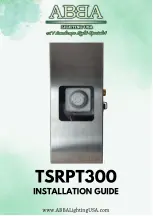
Section 1
1.1
INSTALLATION
GENERAL
The overall accuracy of a flow, level, or pressure measurement depends on several variables. Although
the transmitter has an outstanding performance, proper installation is essential to maximize its
performance.
Among all factors, which may affect transmitter accuracy, environmental conditions are the most
difficult to control. There are, however, ways of reducing the effects of temperature, humidity and
vibration.
The LD301 has a built-in temperature sensor to compensate for temperature variations. At the factory,
each transmitter is submitted to a temperature cycle, and the characteristics under different
temperatures are recorded in the transmitter memory. At the field, this feature minimizes the
temperature variation effect.
Locating the transmitter in areas protected from extreme environmental changes can minimize
temperature fluctuation effects.
In warm environments, the transmitter should be installed to avoid, as much as possible, direct
exposure to the sun. Installation close to lines and vessels subjected to high temperatures should also
be avoided. Use longer sections of impulse piping between tap and transmitter whenever the process
fluid is at high temperatures. Use of sunshades or heat shields to protect the transmitter from external
heat sources should be considered, if necessary.
Humidity is fatal to electronic circuits. In areas subjected to high relative humidity, the O-rings for the
electronic housing covers must be correctly placed and the covers must be completely closed by
tighten them by hand until you feel the O-rings being compressed. Do not use tools to close the covers.
Removal of the electronics cover in the field should be reduced to the minimum necessary, since each
time it is removed; the circuits are exposed to the humidity.
The electronic circuit is protected by a humidity proof coating, but frequent exposures to humidity may
affect the protection provided. It is also important to keep the covers tightened in place. Every time they
are removed, the threads are exposed to corrosion, since painting cannot protect these parts. Code-
approved sealing methods should be employed on conduit entering the transmitter. The unused outlet
connection should be plugged accordingly.
Although the transmitter is virtually insensitive to vibration, installation close to pumps, turbines or other
vibrating equipment should be avoided.
Proper winterization (freeze protection) should be employed to prevent freezing within the measuring
chamber, since this will result in an inoperative transmitter and could even damage the cell.
NOTE:
When installing or storing the level transmitter, the diaphragm must be protected to avoid
scratching-denting or perforation of its surface.
MOUNTING
The transmitter has been designed to be both rugged and lightweight at the same time. This make its
mounting easier mounting positions are shown in Figure 1.1.
Existing standards for the manifolds have also been taken into account, and standard designs fit
perfectly to the transmitter flanges.
Should the process fluid contain solids in suspension, install valves or rod-out fittings at regular
intervals to clean out the pipes.
The pipes should be internally cleaned by using steam or compressed air, or by draining the line with
the process fluid, before such lines are connected to the transmitter (blow-down).
Summary of Contents for ld301
Page 14: ...LD301 Operation and Maintenance Instruction Manual 1 8...
Page 18: ...LD301 manual de Instru es Opera o e manuten o 2 4 Fig 2 3 LD301 Software Block Diagram...
Page 50: ...LD301 Operation and Maintenance Instruction Manual 4 16...
Page 55: ...Maintenance Procedure 5 5 Fig 5 1 Exploded View...
Page 62: ...LD301 Operation and Maintenance Instruction Manual 5 12...
Page 70: ...APPENDIX A...







































